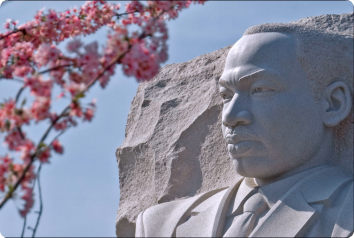 I won’t let my kids file Martin Luther King, Jr. Day into the category of non-gift-giving holidays that serve only to close school for the day.
I won’t let my kids file Martin Luther King, Jr. Day into the category of non-gift-giving holidays that serve only to close school for the day.
No matter the age, I’ll tell my children that the holiday is bigger—filled with purpose that we should each deeply understand.
I’m not a teacher, so I do not plan to commemorate the day with a lecture about who M.L.K. was.
In fact, I’ll talk very little about the “who” and “where” of this great man’s life. I will assume that school and textbooks will tell them about his leadership during the Civil Rights Movement, his birth in Atlanta or his assassination in Memphis.
M.L.K. Day, for me, requires more.
The national day of celebration is less about timelines and facts, video clips or canned lines that my kids have heard before. The day is about remembering the lessons that Dr. King continues to teach us and expects us to heed.
In doing so, in some small way, King’s spirit will live in my children.
Three lessons, in particular, come to mind:
(1) One voice, selflessly driven by purpose can do BIG things.
My kids should understand the potential impact that comes from dogged, passionate efforts to make an impact for a worthy cause.
If something matters to my children, they should champion its proliferation.
Waiting for someone else to make a difference is not acceptable. Just as inadmissible is allowing the complexity of a noble pursuit to immediately squash the effort to find its solution.
Dr. King tells us, “Faith is taking the first step when you don’t see the whole staircase.”
(2) The enhanced power of words when paired with actions.
Martin Luther King’s words were made more pervasive by the power his actions gave to them.
It was not the stirring, heart-felt speeches that, alone, propelled Dr. King into a leadership role during the Civil Rights Movement.
King’s words had power because his actions gave them credibility.
My kids will grow up with their words being forever stained into the fabric of “the cloud”—chasing likes and bragging about re-tweets. They need to know that those words have no lasting power if they are not anchored by substance.
Substance and credibility do not come from being the loudest on the playground, having the most followers or garnering the most likes—they are a product of setting an example that makes those around us ready to listen and swift to act when asked.
Dr. King tells us, “In the end, we will remember not the words of our enemies, but the silence of our friends.”
(3) The importance of being principle-centered.
I should ask my kids more often: What do you stand for?
Hell, maybe I need to ask myself, too.
The question is a quick way to re-enforce what principles are to my kids—bringing to light the deep, internal values that serve as catalysts for them to act.
They should be comfortable answering differently at different times—principles change with experiences.
My 6 year old might stand for fighting me for sugar cereal on Friday while I’d expect my older child to think harder about their answer. As they age, my kids should come up with principles that highlight issues requiring more work to solve.
These discussions stoke the fires of passion.
Dr. King tells us, “No one really knows why they are alive until they know what they’d die for.”
On Monday, we celebrate a great man, a pioneer, a warrior and a legacy that is as meaningful as any I can think of.
That is not all, though.
I’ll take the day to help my kids search for the qualities Dr. King implored them to develop to continue his work:
- finding your voice
- making a difference
- the value of tireless efforts in the face of daunting obstacles
- building credibility and using it for good
- embracing the principles that feed a lasting legacy
Dr. King taught us these lessons and my kids should carry them on.
My children can ready themselves to prepare their own, personal, principle-driven, passion-filled “I Have a Dream” speech whenever they find their worthwhile cause to champion.
As Dr. King tells us, “We must build dikes of courage to hold back the flood of fear.”
About the Author: Tobin Walsh is an adoptive father who sincerely and humorously blogs about parenting and adoption. You can read this original post on his blog, The Good-Bad Dad.
*Image via Flickr, Ron Cogswell


